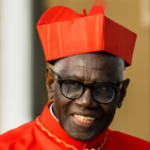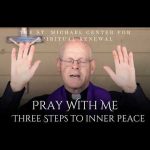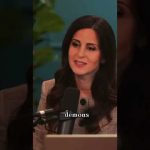Catherine Clifford, a professor at St. Paul University in Ottawa, and Archbishop Stanisław Gadecki of Poland at the Synod on Synodality’s Oct. 26, 2023, press briefing. / Credit: Daniel Ibáñez/EWTN News
Vatican City, Oct 26, 2023 / 13:35 pm (CNA).
A Polish archbishop said Thursday one difficulty of synodality lies in distinguishing pastoral practice — which can be adapted to different cultural circumstances — from Church doctrine.
“In doctrine, the Church cannot bring to it the different viewpoints of those coming from the other continents or other parts of the world. Doctrine has to be ‘catholic’ [universal] and the same for everyone,” Archbishop Stanislaw Gadecki of Poznan said at a press briefing for the Synod on Synodality on Oct. 26.
This is in contrast, the president of the Polish bishops’ conference said, to “different pastoral expressions” of doctrine as appear in different cultures, languages, and historical situations.
Gadecki is one of three Polish bishops participating in the Vatican’s Oct. 4–29 assembly of the Synod of Bishops on synodality.
He said the method of this synod brings both differences and agreements, and participants are not hiding the challenges.
“It would be useless to get together for a month and hide difficulties that exist in different situations or in connection with different issues that require an answer,” he said.
On pastoral practice versus doctrine, Gadecki underlined that “countries have their own histories and they must also be in tune with that history” — including negative responses to the Church’s actions.
He said different pastoral expressions do not influence Christian doctrine, the magisterium, holy Scripture, and sacred tradition.
“As far as the essential things are concerned, there cannot be a development of Christian doctrine, but in the things that are not essential, there can always be a change as long as that change is a true development,” he said, referencing the theological concept of the development of doctrine.
A Romanian Orthodox bishop, who is taking part in the synod as a fraternal delegate, a participant without a vote, said one challenge in the Orthodox understanding of synodality is in reaching a consensus among bishops.
“In the Orthodox church, it’s not the majority that ‘decides’ as we often see in synodal processes,” Metropolitan Iosef of Western and Southern Europe said.
The good thing about synodality, he added, “is you’re never alone when you make decisions.”















